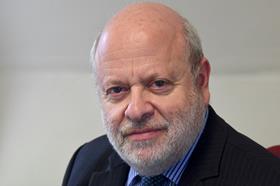A damaging aspect of our lives at the moment is that we are living in a state of political limbo.

There will presumably be a new party in government soon, likely with a sizeable majority. The feeling that we have a lame-duck government just living out its term from day to day is widespread. Every policy discussion in which I participate looks to what the next government is likely to do.
This limbo is intensified by the fact that the party likely to make up the next government is being so careful not to commit to much – there is no money, it doesn’t want to give hostages to fortune, nor to offer policies that the current government might adopt and neutralise, and so on.
The danger is that this feeling of limbo saps our energy, turns us into passive bystanders, and stops us actively thinking about how we will be responsible for our own future (meaning the future of legal services), regardless of what any government does.
I wrote about this topic last month under ‘Broken Britain’. I offered a partial solution to our problems, one not based on waiting for a government to act (the ‘waiting for Godot’ syndrome). I suggested a national effort to co-ordinate and funnel pro bono on a consistent and organised basis across all the current providers of pro bono (which are numerous), to serve those who have no access to legal aid, while supporting those organisations which already give such help, and not competing with the remaining legal aid firms.
There were comments under that article both about existing efforts at such coordination, and also about the dangers of pro bono being seen as a solution.
Now I shall offer another possible solution which would release private resources for an improvement in legal services. This solution also raises hackles and problems: it is the question of who should benefit from interest on clients’ money. I emphasise that these are my own ideas, and not part of Law Society policy discussions.
(The Law Society, though, is not paralysed by the current limbo: its 21st Century Justice Project is actively considering solutions for the future.)
There are programmes in other jurisdictions which provide considerable resources from interest on clients’ money. There are two basic methods, either common law or civil law.
In the common law, there is IOLTA (interest on lawyers’ trust accounts).
IOLTA programmes were first established in Australia and Canada in the late 1960s and early 1970s to generate funds for legal services for low-income and vulnerable individuals. There are now IOLTA programmes throughout 10 Canadian provinces and three territories and all United States jurisdictions. In other words, we are rather a common law outlier in not adopting it.
In some of these jurisdictions, all the clients’ money interest goes to good causes, for instance for providing legal services to those unable to afford it, for public education or for topping up what we call the compensation fund. In other jurisdictions, such as the USA and Canada, it is only the interest on amounts from a single client which are quite small or held for only a short period of time, and cannot earn interest for the client in excess of the costs incurred to collect that interest. But even then, the American Bar Association has calculated that, since 1981, IOLTA has generated over $4 billion in revenue, and over $175 million in 2020 alone.
There is a much more radical solution in some civil law jurisdictions, for instance France. They have CARPA (Caisses des Règlements Pécuniaires des Avocats), which means that all lawyers’ client money is paid directly into a central bar account under the control of the president of the bar. It is a disciplinary offence for a lawyer not to pay over the funds in this way. And the interest is used by the bar for the same kinds of good causes as IOLTA benefits. A huge amount of interest is generated through the CARPA system, because the bars are able to negotiate good interest rates from the banks on such large deposits.
There is an added advantage claimed by the French system, which is that theft of client money is practically impossible, and, they say, money laundering and other lawyer-related financial crimes are next to impossible, too.
England and Wales has many dissimilarities from France as a legal jurisdiction (French avocats do not undertake conveyancing, for a start), but it is more difficult to argue that we have relevant differences with the IOLTA common law countries.
These systems are not free of disadvantages, including that they take the pressure off the government to provide proper funding for the legal system out of general taxation.
But we have to start thinking about possible solutions for our dire situation, even difficult solutions.
Jonathan Goldsmith is Law Society Council member for EU & International, chair of the Law Society’s Policy & Regulatory Affairs Committee and a member of its board. All views expressed are personal and are not made in his capacity as a Law Society Council member, nor on behalf of the Law Society































No comments yet